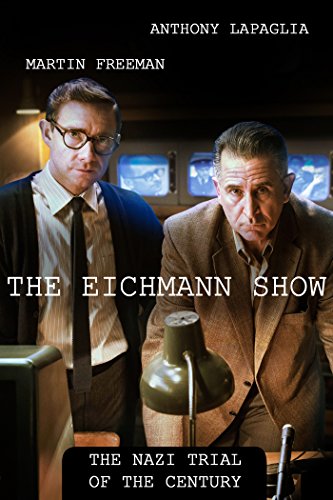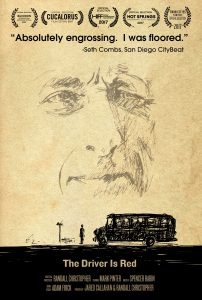This month, Jodi Elowitz shares three selections that explore the obsession with Adolf Eichmann in film.
 As we watch neo-Nazis and white supremacists on our TV’s and in our news feeds it might be a good time to reacquaint ourselves with the original Nazis and just what happens when we remain silent. On Netflix, we can watch The Eichmann Show (2015), which portrays the decisions made towards filming the 1961 trial of Adolf Eichmann, head of Jewish Affairs, who was responsible for deporting the Jews of Europe to their deaths. In the aftermath of liberation, Eichmann fled Europe and went into hiding in Argentina, until he was kidnapped by Mossad agents and brought to trial in Israel. The Eichmann Show, produced by BBC, stars Martin Freeman as producer, Milton Fruchtman, and Anthony LaPaglia as director, Leo Hurwitz. Both excellent actors have little acting to do since they take a lesser role to the integrated footage from the actual trial. The screen alternates from black and white to color as we move from the actual footage to the representational courtroom. Mainly focused on the arguments between Hurwitz and Fruchtman on the purpose of the filming, we are shown the obsessive nature of both men on a mission. Hurwitz is determined that the camera and the magic of film will compel Eichmann to show us his soul and that we will see a moment of recognition and regret for his crimes. Fruchtman is less concerned with finding Eichmann’s humanity as he is televising the “trial of the century.” He is more focused on the emotional impact of the recounting of the horrors of the Holocaust by the survivors. The trial was important for both playing a role in our understanding of the Holocaust, and because it was the first televised world news event, which would lead to other televised “trials of the century.” The trial is important because it helped us understand that those who died did not go like sheep to the slaughter, and it helped lift the stigma attached to survivors (especially in Israel), as the Nazi crimes were explained in full detail by those who experienced it firsthand.
As we watch neo-Nazis and white supremacists on our TV’s and in our news feeds it might be a good time to reacquaint ourselves with the original Nazis and just what happens when we remain silent. On Netflix, we can watch The Eichmann Show (2015), which portrays the decisions made towards filming the 1961 trial of Adolf Eichmann, head of Jewish Affairs, who was responsible for deporting the Jews of Europe to their deaths. In the aftermath of liberation, Eichmann fled Europe and went into hiding in Argentina, until he was kidnapped by Mossad agents and brought to trial in Israel. The Eichmann Show, produced by BBC, stars Martin Freeman as producer, Milton Fruchtman, and Anthony LaPaglia as director, Leo Hurwitz. Both excellent actors have little acting to do since they take a lesser role to the integrated footage from the actual trial. The screen alternates from black and white to color as we move from the actual footage to the representational courtroom. Mainly focused on the arguments between Hurwitz and Fruchtman on the purpose of the filming, we are shown the obsessive nature of both men on a mission. Hurwitz is determined that the camera and the magic of film will compel Eichmann to show us his soul and that we will see a moment of recognition and regret for his crimes. Fruchtman is less concerned with finding Eichmann’s humanity as he is televising the “trial of the century.” He is more focused on the emotional impact of the recounting of the horrors of the Holocaust by the survivors. The trial was important for both playing a role in our understanding of the Holocaust, and because it was the first televised world news event, which would lead to other televised “trials of the century.” The trial is important because it helped us understand that those who died did not go like sheep to the slaughter, and it helped lift the stigma attached to survivors (especially in Israel), as the Nazi crimes were explained in full detail by those who experienced it firsthand.
Eichmann framed within bulletproof glass, could not be moved by the testimony of the survivors or the evidence, and remained stoic throughout. Hurwitz, focuses on using close ups on his face, hoping to show that the crimes he committed were carried out by a human and not a monster, thus lending credibility to Hannah Arendt’s famous banality of evil label. However, what both Hurwitz and the rest of the world would discover is that Eichmann was in no way banal as he went beyond the call of duty in order to get the job done. Eichmann grew in his job and perfected the system that would bring millions to their death, even when the war was lost he did not stop, as he deported 440,000 Hungarian Jews in the summer of 1944. In fact it is Eichmann’s pride in his role, which he told to a reporter in Argentina, that helped establish his whereabouts leading to his capture.
 Also on Netflix is, The People vs. Fritz Bauer (2015). Burghardt Klaußner plays German judge and prosecutor, Fritz Bauer, as an embittered and tired man obsessed with finding and bringing Nazis to justice in postwar Germany. The problem is that no one wants him to find the Nazis. This puts him at odds with those who would prefer to forget their complicit or active roles that they played during the Third Reich. Nazis hiding in plain sight were not interested in the possibility of higher ranking officials implicating them upon capture and interrogation. The film opens with Bauer being at the “end of his rope,” as we are introduced to him in the aftermath of what appears to be an attempted suicide, which is used by his colleagues to try and remove him from office. Bauer, who was quietly responsible for the capture of Adolf Eichmann, was also responsible for bringing in many other Nazi’s which led to the Auschwitz trials of 1960’s. The film veers away from the hunt for Eichmann to focus on Bauer’s relation with a fictional member of his staff, Karl Angermann. This character was played by Ronald Zehrfeld who has appeared in two films that also deal with the aftermath of WWII in Germany. Zehrfeld, who has the most expressive eyes, gains our immediate empathy, as the film attempts to navigate Bauer’s and Angermann’s closeted homosexuality. The film tries to draw parallels between the Nazi’s who have found it possible to live in the open after committing their crimes, and homosexuals, who still needed to hide since homosexuality was still considered a crime punishable with long prison sentences.
Also on Netflix is, The People vs. Fritz Bauer (2015). Burghardt Klaußner plays German judge and prosecutor, Fritz Bauer, as an embittered and tired man obsessed with finding and bringing Nazis to justice in postwar Germany. The problem is that no one wants him to find the Nazis. This puts him at odds with those who would prefer to forget their complicit or active roles that they played during the Third Reich. Nazis hiding in plain sight were not interested in the possibility of higher ranking officials implicating them upon capture and interrogation. The film opens with Bauer being at the “end of his rope,” as we are introduced to him in the aftermath of what appears to be an attempted suicide, which is used by his colleagues to try and remove him from office. Bauer, who was quietly responsible for the capture of Adolf Eichmann, was also responsible for bringing in many other Nazi’s which led to the Auschwitz trials of 1960’s. The film veers away from the hunt for Eichmann to focus on Bauer’s relation with a fictional member of his staff, Karl Angermann. This character was played by Ronald Zehrfeld who has appeared in two films that also deal with the aftermath of WWII in Germany. Zehrfeld, who has the most expressive eyes, gains our immediate empathy, as the film attempts to navigate Bauer’s and Angermann’s closeted homosexuality. The film tries to draw parallels between the Nazi’s who have found it possible to live in the open after committing their crimes, and homosexuals, who still needed to hide since homosexuality was still considered a crime punishable with long prison sentences.
 A third film about Eichmann, The Driver is Red recently premiered at the Twin Cities Film Fest on October 22. The animated short continues the narrative set forth in the two Netflix streaming films, telling the story of the identification and capture of Eichmann known as “Operation Eichmann.” The film takes us through the timeline, with historical references to the rise of Nazism and its leaders, through a series of sketches that appear as if we were watching an artist flesh out scenes in their notebook in real time. The drawings combined with the first person narrative by Zvi Aharoni (voiced by Mark Pinter), the Mossad Agent who led the operation, gives us a unique view into the capture and the overall historic event.
A third film about Eichmann, The Driver is Red recently premiered at the Twin Cities Film Fest on October 22. The animated short continues the narrative set forth in the two Netflix streaming films, telling the story of the identification and capture of Eichmann known as “Operation Eichmann.” The film takes us through the timeline, with historical references to the rise of Nazism and its leaders, through a series of sketches that appear as if we were watching an artist flesh out scenes in their notebook in real time. The drawings combined with the first person narrative by Zvi Aharoni (voiced by Mark Pinter), the Mossad Agent who led the operation, gives us a unique view into the capture and the overall historic event.
Christopher, an artist, was moved to make the film based on his fear that ordinary American citizens do not know history, and was inspired by a video made a few years ago by Rhonda Fink Whitman. Whitman interviewed college students in Pennsylvania to show how little they knew about the Holocaust in order to show the need for mandatory Holocaust education in the state.
The three films taken together provide a glimpse into the capture and trial of Adolf Eichmann, reminding us of its historic significance and how far Germany has come in dealing with its horrific past. The Eichmann trial is available on Yad Vashem’s YouTube channel, and now would be a good time for many of us to remind ourselves of just how shocking the crimes committed were and how we need to remain vigilant in the face of prejudice and hatred.
Jodi Elowitz is the director of education at the Center for Holocaust and Humanity.

Comments